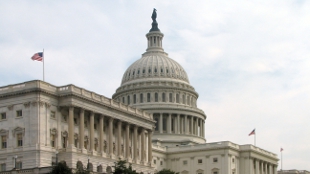 WIKIMEDIA, SCRUMSHUSBecause legislators in Congress failed to pass a temporary 2014 spending bill before today, the US government is officially “shut down” for the first time in 17 years. This means that some government offices are shuttered, nonessential services are halted, and some 800,000 government employees won’t be at work today. Furloughs triggered by the shutdown apply to most federal scientists, except those involved in patient or animal care. But the effects of the shutdown—though unlikely to last more than a month or so—might also trickle down to academic researchers, many of whom are funded through grants administered by the National Institutes of Health (NIH) and National Science Foundation (NSF).
WIKIMEDIA, SCRUMSHUSBecause legislators in Congress failed to pass a temporary 2014 spending bill before today, the US government is officially “shut down” for the first time in 17 years. This means that some government offices are shuttered, nonessential services are halted, and some 800,000 government employees won’t be at work today. Furloughs triggered by the shutdown apply to most federal scientists, except those involved in patient or animal care. But the effects of the shutdown—though unlikely to last more than a month or so—might also trickle down to academic researchers, many of whom are funded through grants administered by the National Institutes of Health (NIH) and National Science Foundation (NSF).
Environmental Protection Agency (EPA) administrator Gina McCarthy told Chemical & Engineering News that her agency would essentially close, keeping most of its 17,000 workers off the payroll. The Department of Defense is also furloughing scientists by telling civilian employees, which include researchers in its Office of Science, to stay home starting today. Starting today, the NIH is temporarily closed, with intramural research projects there—such as clinical trials—halted for the time being. Services like meat inspections, conducted by scientists at the US Department of Agriculture, however, are continuing in the face of the shutdown.
But should the shutdown last more than a week, federally funded employees at universities could start to feel the pinch. The Chronicle of Higher Education quoted the Education Department’s contingency plan as ...














